Angel Time Read online
Page 2
“Boss, you’re worrying yourself about nothing. I have more books now than I know what to do with. Twice a month, I drop a box at some library. I’m perfectly fine.”
“What about a penthouse somewhere, Lucky? What about some rare books? There must be something I can get for you more than just money. A penthouse would be nice, safe. You’re always safe when you’re higher up.”
“Safe up in the sky?” I’d asked. The fact was my Beverly Hills apartment was a penthouse, but the building was only five stories high. “Penthouses are usually reached by two methods, Boss,” I said, “and I don’t like being bottled up. No thanks.”
I felt secure in my Beverly Hills penthouse and it was walled with books on just about every epoch that had preceded the twentieth century.
I’d known for a long time why I loved history. It was because the historians made it sound so coherent, so purposeful, so complete. They’d take an entire century and impose a meaning on it, a personality, a destiny—and this was, of course, a lie.
But it soothed me in my solitude to read that sort of writing, to think that the fourteenth century was a “distant mirror,” to paraphrase a famous title, to believe that we could learn from whole eras as if they had existed with marvelous continuity simply for us.
It was good reading in my apartment. It was good reading at the Mission Inn.
I liked my apartment for more reasons than one. As my undisguised self, I liked to walk in the soft, quiet neighborhood around it, and to stop in the Four Seasons Hotel for breakfast or lunch.
There were times when I checked into the Four Seasons just to be someplace completely different, and I had a favorite suite there with a long granite dining table and a black grand piano. I would play the piano in that suite, and sometimes even sing, with the ghost of the voice I’d once had.
Years ago, I’d thought I’d be singing all my life. It was music that had taken me away from wanting to be a Dominican priest—that and growing up, I suppose, and wanting to be with “girls” and wanting to be a man of the world. But mostly it was the music that had ravaged my twelve-year-old soul, and the total charm of the lute. I think I felt superior to the garage band kids when I played that beautiful lute.
All that was over, and had been over for ten years—the lute was a relic now—and the anniversary had come around and I wasn’t telling The Right Man my address.
“What can I get you?” he still pleaded. “You know I was in a rare-book shop the other day, just by chance actually. I was roaming in Manhattan. You know me and roaming. And I saw this beautiful old medieval book.”
“Boss, the answer is nothing,” I said. And I hung up.
The next day, after that phone call, I’d talked about that to the Non-existent God in the Serra Chapel, in the flicker of the red sanctuary light, and told Him what a monster I was being, a soldier without a war, and a needle sniper without a cause, a singer who never really sang. As if He cared.
And then I’d lit a candle “To the Nothingness” that had become my life. “Here’s a candle … for me.” I think I’d said that. I’m not sure. I know I was talking way too loud by that time because people noticed me. And that surprised me because people seldom notice me at all.
Even my disguises were for the nondescript and the pale.
There was a consistency, though I doubt anyone ever caught on. Grease-slicked black hair, heavy dark glasses, a bill cap, leather pilot’s jacket, the usual dragging foot, but never the same foot.
That was plenty enough to make me a man nobody saw. Before I’d ever gone as myself, I’d run three or four disguises by the desk of the Mission Inn, and three or four different names to go with them. It went perfectly fine. When the real Lucky the Fox walked in with the alias Tommy Crane, no one showed a flicker of recognition. I was too good at the disguises. For the agents that hunted me, I was a modus operandi, not a man with a face.
That last time, I’d walked out of the Serra Chapel, angry, and confused, and miserable, and was only comforted by spending the day in the picturesque little town of San Juan Capistrano, and buying a statue of the Virgin in the Mission gift shop before it closed.
It wasn’t just an ordinary little Virgin. It was a figure with the Christ Child and the whole made not only with plaster but plastered cloth. It looked dressed and soft, though it wasn’t. It was dressed and stiff. And it was sweet. The little Baby Jesus had a lot of character, with His tiny head tilted to one side, and the Virgin herself was just a teardrop face and two hands emerging from the fancy robes of gold and white. I threw the box in my car at the time and didn’t give it much of a thought.
Whenever I went to Capistrano, however—and last time had been no exception—I heard Mass in the new Basilica, the grand re-creation of the big church broken to pieces in 1812.
I was very impressed and quieted by the Grand Basilica. It was vast, expensive, Romanesque, and, like so many Romanesque churches, filled with light. Round arches again everywhere. Exquisitely painted walls.
Behind the altar there was another golden retablo, one that made the one in the Serra Chapel look small. This too was ancient and shipped from the Old Country, just as the other had been, and covering the entire back wall of the sanctuary to a momentous height. It was overwhelming in its dazzling gold.
Nobody knew it, but I sent money now and then to the Basilica, though rarely under the same name. I’d buy postal money orders and make up joke names to put on them. The money got there, that was the point.
Four saints had their appropriate niches in the retablo—St. Joseph with his inevitable lily, the great St. Francis of Assisi, Blessed Junípero Serra holding a small model of the mission in his right hand, and then a newcomer as far as I was concerned, Blessed Kateri Tekakwitha, an Indian saint.
But it was the center of the retablo that most completely absorbed me as I sat through Mass. There was the Crucified Christ in high gloss with bloodied hands and feet, and above Him a bearded figure of God the Father who was under the golden rays descending from a white dove. This was the Holy Trinity actually though maybe a Protestant wouldn’t have known it—with the three figures rendered in literal form.
When you think that only Jesus became Man to save us, well, the figure of God the Father and the Holy Spirit as a dove can be puzzling, and touching. The Son of God, after all, has the body.
Whatever the case, I marveled at it, and enjoyed it. I didn’t care whether it was literal or sophisticated, mystical or pedestrian. It was gorgeous, it was gleaming, and it comforted me to see it, even when I was steaming with hate. It comforted me that other people around me were worshipping, that I was somewhere sacred or where people came to be with the sacred. I don’t know. I pushed any self-accusations out of my mind and just looked at what was right before me, just the way I do when I’m on the job, and set to take a life.
Maybe when I looked up from the pew at this Crucifix, it was like running into a friend with whom you are angry and saying, “Well, there you are again and I am still in a rage against you.”
Underneath the dying Lord was his Blessed Mother, in the form of Our Lady of Guadalupe, whom I’d always admired.
That last visit, I’d spent hours staring at that golden wall.
This wasn’t faith. This was art. The art of faith forgotten, the art of faith denied. This was excess, this was egregious and somehow soothing, even if I did keep saying, “I don’t believe in you, I’ll never forgive you for not being real.”
After Mass that last time, I took out the rosary I’d carried since boyhood, and I said it, but I didn’t meditate on the old mysteries that meant nothing to me. I merely lost myself in the mantric chant. Hail Mary, Full of Grace, as if I believe you exist. Now and at the Hour of our Death Amen Like Hell For Them are you ever there?
Mind you, I was certainly not the only hit man on this planet who went to Mass. But I was one of a very small minority who paid attention, murmuring the responses and sometimes even singing the hymns. Sometimes I even went to Communion, so
aked in mortal sin, and defiant. I knelt afterwards with head bowed and I thought: This is Hell. This is Hell. And Hell will be worse than this.
There’ve always been criminals great and small who went to Mass with their families and presided over sacramental occasions. I don’t have to tell you about the Italian Mafioso of cinematic legend who goes to his daughter’s First Communion. Don’t they all?
I had no family. I had no one. I was no one. I went to Mass for myself who was no one. In my files at Interpol and the FBI, they said so: he is no one. No one knows what he looks like, or where he came from, or where he will appear next. They didn’t even know if I worked for one man.
As I said, I was a modus operandi to them, and they’d taken years to refine it, listing vaguely disguises poorly glimpsed by video surveillance, never yielding to precise words. Often they detailed the hits with considerable misunderstanding of what had actually taken place. But they did have it almost right: I was nobody. I was a dead man walking around in a live body.
And I did work for only one man, my boss, the one I called, in my heart of hearts, The Right Man. It simply never occurred to me to work for someone else. And nobody else could have sought me out for an assignment, and no one else ever would.
The Right Man might have been the bearded God the Father, of the retablo, and I his bleeding son. The Holy Ghost was the spirit that bound us, because we were bound, that was certain, and I never thought past the commands of The Right Man.
That’s blasphemy. So what?
How did I know these things about police files and agency files? My beloved boss always had his connections, and he’d chuckle with me on the phone about the information that came his way.
He knew what I looked like. On the night we met, some ten years back, I’d been myself with him. That he hadn’t laid eyes on me in years disturbed him.
But I was always there when he rang, and whenever I dumped the cell phones, I called him with the new numbers. In the beginning, he’d helped me get the phony papers, passports, driver’s licenses, and such. But I’d long known how to acquire that sort of material on my own, and how to confuse the people who provided it to me.
The Right Man knew I was loyal. Not a week went by that I didn’t call in, whether he called me or not. Sometimes I felt a sudden breathlessness when I heard his voice, just because he was still there, because fate hadn’t taken him away from me. After all, if one man is your entire life, your vocation, your quest, well, then, you’re going to be afraid of losing him.
“Lucky, I want to sit down with you,” he sometimes said. “You know, the way we did that first couple of years. I want to know where you come from.” I’d laugh as gently as I could.
“I love the sound of your voice, Boss,” I’d say.
“Lucky,” he asked me one time, “do you yourself know where you come from?”
That had really made me laugh, but not at him, just at everything.
“You know, Boss,” I’d said more than once, “there are questions I’d like to ask you, like who you really are, and who you work for. But I don’t ask you, do I?”
“You’d be surprised at the answers,” he said. “I told you once, kid, you’re working for The Good Guys.” And that’s where we left it.
The Good Guys. The good gang or the good organization? How was I to know which? And what did it matter, because I did exactly what he told me to do, so how could I be good?
But I could dream, from time to time, that he was on the good side of things, that government legitimated it, cleaned it up, made me an infantryman, made me okay. That’s why I could call him The Right Man, and tell myself, Well, maybe he is FBI, after all, or maybe he’s Interpol working in this country. Maybe we’re doing something meaningful. But in truth, I didn’t believe it. I committed murder. I did it for a living. I did it for no reason at all except to go on living. I killed people. I killed them without warning and without an explanation as to why I did it. The Right Man might have been one of The Good Guys, but I certainly was not.
“You’re not afraid of me, are you, Boss?” I asked him once. “That I’m just a little bit out of my mind, and someday, I’ll bail on you, or come back at you. Because you don’t need to be afraid of me, Boss. I’m the last person who’ll ever hurt a hair on your head.”
“I’m not afraid of you, no, Son,” he said. “But I worry about you out there. I worry because you were a kid when I took you up. I worry … about how you make it through the night. You’re the best I’ve got, and sometimes it just seems too easy calling you, and your always being there, and things working out perfectly, and me having to say so few words.”
“You like to talk, Boss, that’s one of your characteristics. I don’t. But I’ll tell you something. It’s not easy. It’s thrilling, but it’s never easy. And sometimes it takes my breath away.”
I don’t remember what he’d said to that little confession, except that he’d talked for a long time, saying, among other things, that everybody else who worked for him periodically checked in. He saw them, knew them, visited them.
“It’s not going to happen with me, Boss,” I’d assured him. “What you hear is what you get.”
And now I had to do a job at the Mission Inn.
The call had come last night and woken me up in my Beverly Hills apartment. And I hated it.
CHAPTER TWO
Of Love and Loyalty
AS I SAID BEFORE, THERE NEVER WAS A REAL MISSION, like San Juan Capistrano, at the hotel in Riverside called the Mission Inn.
It was one man’s dream, a giant hotel full of courtyards, arbors, and Mission-style cloisters, with a chapel for weddings and a multitude of charming Gothic elements, including heavy arched wood doors, and statues of St. Francis in niches, and even bell towers, and the oldest-known bell in Christendom. It was a conglomeration of elements that suggested the world of the Missions from one end of California to the other. It was a tribute to them that people found more dizzying and wonderful sometimes than the Missions themselves, fragments that they were. The Mission Inn was also unfailingly lively and warm and inviting, and throbbing with cheerful voices and gaiety and laughter.
From the beginning, I suspect, it was a labyrinth, but it had developed in the hands of new owners so that now it had the conveniences of a top-notch hotel.
Yet you could easily get lost in it, wandering its many verandas, following its innumerable staircases, drifting from patio to patio, or simply trying to find your room.
People create these extravagant habitats because they have vision, love of beauty, hopes, and dreams.
Many an early evening, the Mission Inn swarmed with happy people, brides being photographed on random balconies, families cheerfully wandering the terraces, the many restaurants lighted and filled with lively parties, pianos playing, voices singing, and even a concert, perhaps in the music room. It was dependably festive, and it enfolded me and gave me peace for just a little while.
I had the love of beauty that drove the owners of the place, and a love of excess as well, a love of a vision carried to near divine extremes.
But I had no plans or dreams. I was strictly a messenger, the embodiment of a purpose, go do this, not a man at all.
But over and over, the homeless one, the nameless one, the dreamless one, returned to the Mission Inn.
You could say I loved the fact that it was rococo and meaningless. Not only was it a tribute to all the Missions of California, it had set the architectural tone for some of the town. There were bells on the lampposts on the streets around it. There were public buildings done in the same “Mission style.” I liked that consciously created continuity. It was all made up, the way I was made up. It was a concoction, the way that I myself was a concoction with the accidental name of Lucky the Fox.
I always felt good when I walked under the arched entrance called the campanario, on account of its many bells. I loved the giant tree ferns and the soaring palm trees, their thin trunks wrapped in twinkling light. I loved the flowerbe
ds of bright petunias that banked the front walk.
On any given pilgrimage, I spent a good deal of time in the public rooms. I often sought out the vast dark lobby to visit its white marble statue of the Roman boy pulling the thorn from his foot. I was soothed by the shadowy interior. I loved the laughter and gaiety of the families. I sat in one of the big comfortable chairs, breathing the dust, and watching people. I loved the friendliness that the place seemed to induce.
I never failed to venture into the Mission Inn restaurant for lunch. The piazza was beautiful, with its multistory walls of rounded windows and bowed terraces, and I propped up the New York Times to read, as I ate under the shade of the dozens of overlapping red umbrellas.
But the interior of the restaurant was no less enticing, with its lower walls of bright blue tile, and the beige arches above artfully painted with twining green vines. The scored ceiling was painted like a blue sky with clouds and even tiny birds. Rounded interior doors with many mullions were paneled in mirrors, and similar doors to the piazza brought the sunshine inside. The pleasing chatter of others was like the sound of water gurgling from a fountain. Nice.
I wandered the dark corridors and the different areas of decorative and dusty carpet.
I stopped in the atrio before the St. Francis chapel, my eyes moving over the hugely ornate frame of the doorway, a poured-concrete masterpiece of Churrigueresque style. It warmed my heart to glimpse the inevitable lavish and seemingly eternal wedding preparations, with banquets laid out on draped tables, in silver chafing dishes, and eager people darting about.
I went up to the topmost veranda and, resting against the green iron railing, I looked down upon the restaurant piazza and across it at the immense Nuremberg clock. I often waited for the clock to chime as it does at every quarter of an hour. I wanted to see the large figures in the alcove beneath it slowly progress.

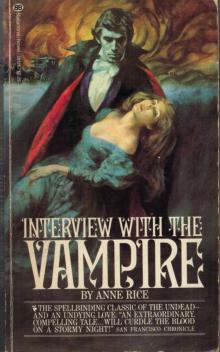 Interview with the Vampire
Interview with the Vampire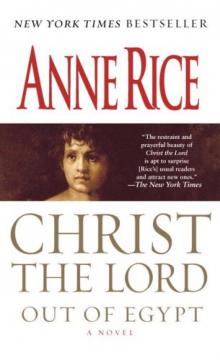 Christ the Lord: Out of Egypt
Christ the Lord: Out of Egypt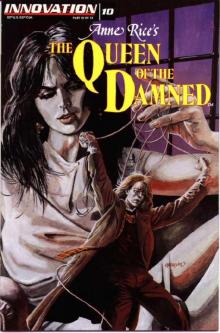 The Queen Of The Damned
The Queen Of The Damned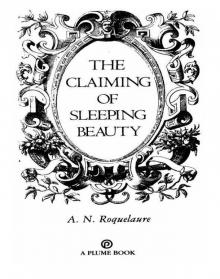 The Claiming of Sleeping Beauty
The Claiming of Sleeping Beauty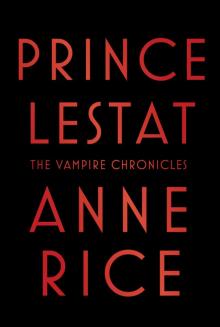 Prince Lestat
Prince Lestat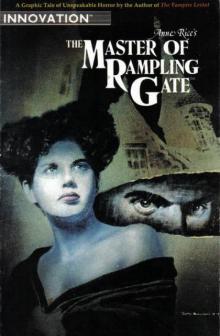 The Master of Rampling Gate
The Master of Rampling Gate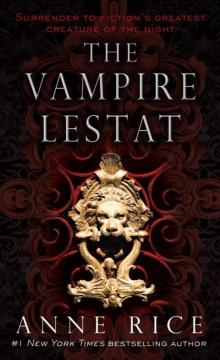 The Vampire Lestat
The Vampire Lestat Blood Canticle
Blood Canticle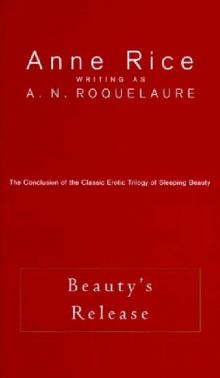 Beauty's Release
Beauty's Release Pandora
Pandora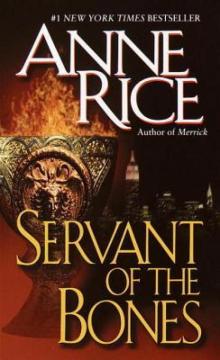 Servant of the Bones
Servant of the Bones Of Love and Evil
Of Love and Evil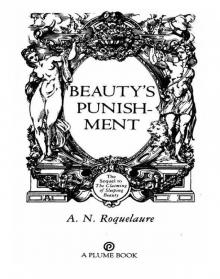 Beauty's Punishment
Beauty's Punishment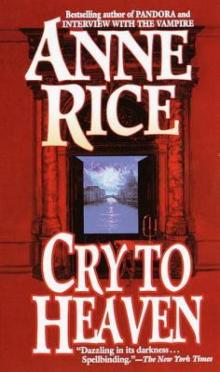 Cry to Heaven
Cry to Heaven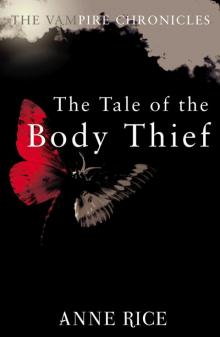 The Tale of the Body Thief
The Tale of the Body Thief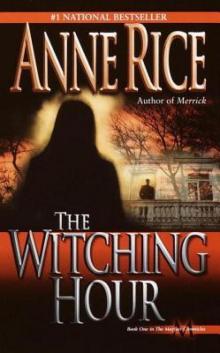 The Witching Hour
The Witching Hour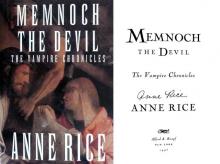 Memnoch the Devil
Memnoch the Devil Blackwood Farm
Blackwood Farm Beauty's Kingdom
Beauty's Kingdom Belinda
Belinda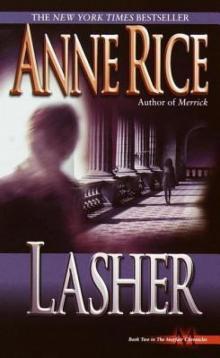 Lasher
Lasher Vittorio, the Vampire
Vittorio, the Vampire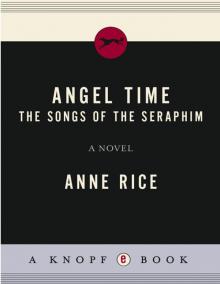 Angel Time
Angel Time Called Out of Darkness: A Spiritual Confession
Called Out of Darkness: A Spiritual Confession Blood And Gold
Blood And Gold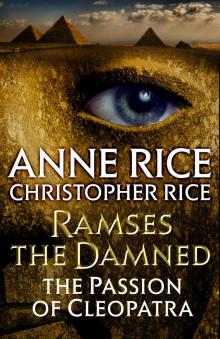 The Passion of Cleopatra
The Passion of Cleopatra Taltos
Taltos Exit to Eden
Exit to Eden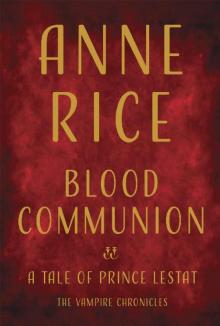 Blood Communion (The Vampire Chronicles #13)
Blood Communion (The Vampire Chronicles #13) The Wolf Gift
The Wolf Gift The Wolves of Midwinter
The Wolves of Midwinter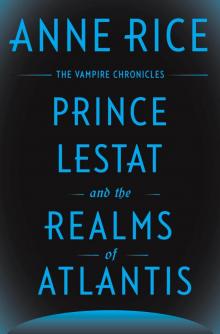 Prince Lestat and the Realms of Atlantis
Prince Lestat and the Realms of Atlantis The Ultimate Undead
The Ultimate Undead The Vampire Lestat tvc-2
The Vampire Lestat tvc-2 The Road to Cana
The Road to Cana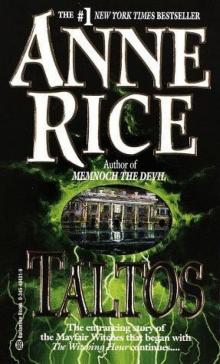 Taltos lotmw-3
Taltos lotmw-3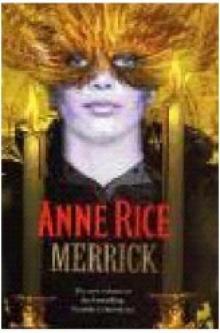 Merrick tvc-7
Merrick tvc-7 Called Out of Darkness
Called Out of Darkness Pandora - New Vampires 01
Pandora - New Vampires 01 Bllod and Gold
Bllod and Gold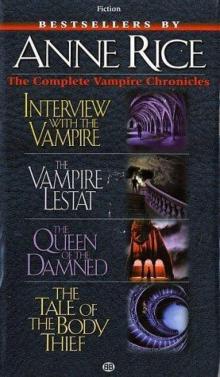 The Queen Of the Damned: Vampire Chronicles
The Queen Of the Damned: Vampire Chronicles The Sleeping Beauty Trilogy
The Sleeping Beauty Trilogy The Claiming of Sleeping Beauty b-1
The Claiming of Sleeping Beauty b-1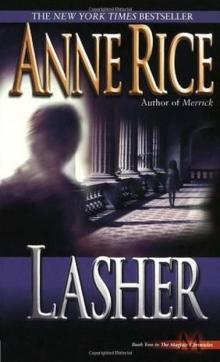 Lasher lotmw-2
Lasher lotmw-2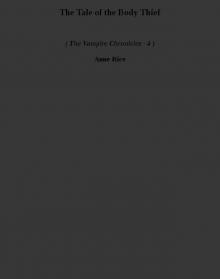 The Tale of the Body Thief tvc-4
The Tale of the Body Thief tvc-4 The Vampire Chronicles Collection
The Vampire Chronicles Collection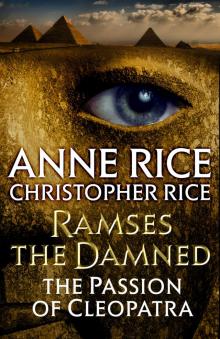 Ramses the Damned
Ramses the Damned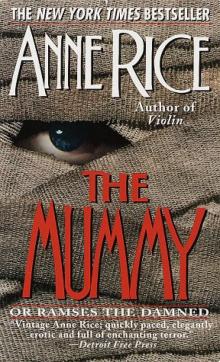 The Mummy - or Ramses the Damned
The Mummy - or Ramses the Damned Vittorio, The Vampire - New Vampires 02
Vittorio, The Vampire - New Vampires 02 The Vampire Armand tvc-6
The Vampire Armand tvc-6 Queen of the Damned tvc-3
Queen of the Damned tvc-3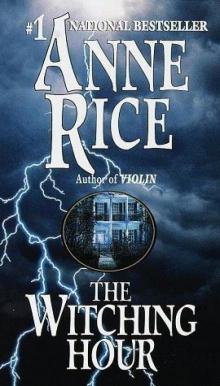 The witching hour lotmw-1
The witching hour lotmw-1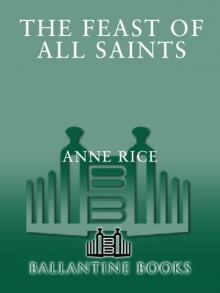 Feast of All Saints
Feast of All Saints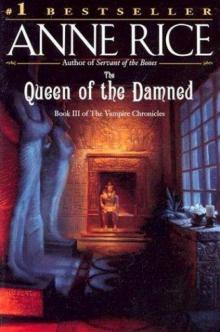 Queen of the Damned
Queen of the Damned The Wolves of Midwinter twgc-2
The Wolves of Midwinter twgc-2 The Mummy
The Mummy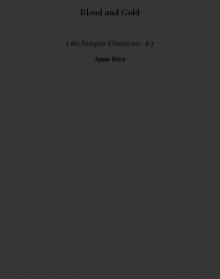 Blood and Gold tvc-8
Blood and Gold tvc-8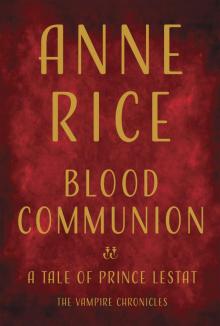 Blood Communion
Blood Communion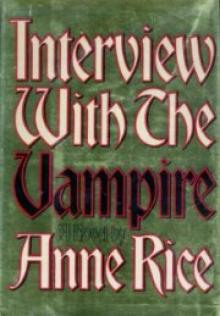 Interview with the Vampire tvc-1
Interview with the Vampire tvc-1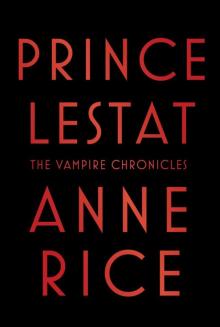 Prince Lestat: The Vampire Chronicles
Prince Lestat: The Vampire Chronicles